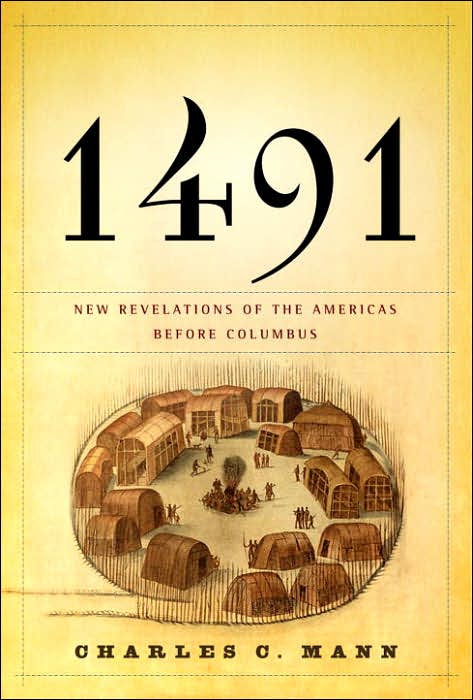Title: 1491: New Revelations of the Americans Before Columbus
Author: Charles C. Mann
Year: 2005
Genre: Non-fiction: History
Rating: 2
I don't really make a habit of reading non-fiction, but this is one book that I had been meaning to read for about two years. It was worth it, even though sometimes reading non-fictional facts was like chewing dry bark. 1491 is excellently researched, compiled, and written, the topics all referring back to the main heading and overall idea of the book. Charles C. Mann tells a beautiful, tragic story through the facts of the history of many societies lost.
1491 has a somewhat interesting format. It starts in the present with Mann flying over the Beni, an immensely historical savanna in Bolivia. He comments on the mounds, then moves gracefully into the book itself (that was only the introduction). He first talks about the Native Americans with which we are most familiar- the Wampanoag, Tisquanto's people- and follows their history up until the time of the Pilgrims. Here, the story is engaging and fascinating as Mann weaves together creative non-fiction with the real and true facts of Tisquanto's life. He then moves to talk about the devastating and horrifying effects of disease on the Native American population. Smallpox is a terrifying thing indeed- a weapon that thinking Europeans could never have matched.
Mann shifts from the colonial New England to the great fall of the Inka (I choose to spell it like that because Mann spells it like that, the original spelling), or Tawantisuyu- the land of the Four Quarters, in Peru. He details the Inkan empire extensively, following the stories of kings and their people, of cities and their conquest. They too fell to disease and Pizarro, but they were torn by civil war long before that. But I shan't spoil the entire book for you- these are only the first two chapters.
Mann is a masterful writer, but even he cannot dislodge my inherent dislike for non-fiction. I lost interest in the book somewhere in the chapter called "Pleistocene Wars"- it was not that the facts were not interesting, only that they became a little tedious. He goes on and on for pages about the "Low Counters" and the "High Counters", which makes the book drag heavily in the middle, glutted with too much information. I think he could have gutted the middle section a little bit more, but it picks up again toward the end when he synthesizes the real story of the history with our perception of it.
I really enjoyed 1491. It took me a while to get through, but it was completely worth it, and made me realize my ancestors' mistakes indeed. The Native Americans made their mistakes, but the Europeans' were far more grave and long-reaching. True, the circumstances of the invasion of the Americas is unlikely to be repeated (Mann recounts the Indians' genetic makeup as "virgin soil" for European diseases, uniquely vulnerable), but we can still learn from their mistakes.
I have this one in paperback, and it's pretty affordable at $16.00. I couldn't find it on eBooks, but because I have in paper copy, I didn't look very hard, so I think it likely that it could be found there. I didn't buy this one from Barnes and Noble, either; I got it from a teeny little bookstore in Iowa City, Iowa, so it is likely available in your local Borders' or Bookman's.
Anyway, that's it for today. Happy reading, my dear pageturners!

No comments:
Post a Comment